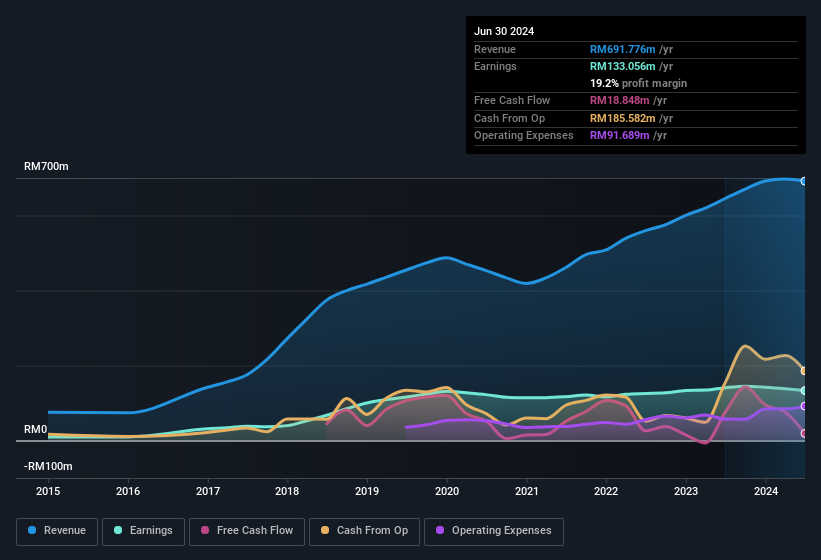- Hong Kong
- /
- Semiconductors
- /
- SEHK:1665
Earnings Troubles May Signal Larger Issues for Pentamaster International (HKG:1665) Shareholders

Investors were disappointed by Pentamaster International Limited's (HKG:1665 ) latest earnings release. We did some further digging and think they have a few more reasons to be concerned beyond the statutory profit.
Check out our latest analysis for Pentamaster International

A Closer Look At Pentamaster International's Earnings
Many investors haven't heard of the accrual ratio from cashflow, but it is actually a useful measure of how well a company's profit is backed up by free cash flow (FCF) during a given period. The accrual ratio subtracts the FCF from the profit for a given period, and divides the result by the average operating assets of the company over that time. This ratio tells us how much of a company's profit is not backed by free cashflow.
As a result, a negative accrual ratio is a positive for the company, and a positive accrual ratio is a negative. That is not intended to imply we should worry about a positive accrual ratio, but it's worth noting where the accrual ratio is rather high. To quote a 2014 paper by Lewellen and Resutek, "firms with higher accruals tend to be less profitable in the future".
Over the twelve months to June 2024, Pentamaster International recorded an accrual ratio of 0.24. Unfortunately, that means its free cash flow fell significantly short of its reported profits. Indeed, in the last twelve months it reported free cash flow of RM19m, which is significantly less than its profit of RM133.1m. Pentamaster International's free cash flow actually declined over the last year, but it may bounce back next year, since free cash flow is often more volatile than accounting profits.
That might leave you wondering what analysts are forecasting in terms of future profitability. Luckily, you can click here to see an interactive graph depicting future profitability, based on their estimates.
Our Take On Pentamaster International's Profit Performance
Pentamaster International didn't convert much of its profit to free cash flow in the last year, which some investors may consider rather suboptimal. Because of this, we think that it may be that Pentamaster International's statutory profits are better than its underlying earnings power. Nonetheless, it's still worth noting that its earnings per share have grown at 15% over the last three years. The goal of this article has been to assess how well we can rely on the statutory earnings to reflect the company's potential, but there is plenty more to consider. With this in mind, we wouldn't consider investing in a stock unless we had a thorough understanding of the risks. For example - Pentamaster International has 1 warning sign we think you should be aware of.
This note has only looked at a single factor that sheds light on the nature of Pentamaster International's profit. But there are plenty of other ways to inform your opinion of a company. For example, many people consider a high return on equity as an indication of favorable business economics, while others like to 'follow the money' and search out stocks that insiders are buying. While it might take a little research on your behalf, you may find this free collection of companies boasting high return on equity, or this list of stocks with significant insider holdings to be useful.
New: Manage All Your Stock Portfolios in One Place
We've created the ultimate portfolio companion for stock investors, and it's free.
• Connect an unlimited number of Portfolios and see your total in one currency
• Be alerted to new Warning Signs or Risks via email or mobile
• Track the Fair Value of your stocks
Have feedback on this article? Concerned about the content? Get in touch with us directly. Alternatively, email editorial-team (at) simplywallst.com.
This article by Simply Wall St is general in nature. We provide commentary based on historical data and analyst forecasts only using an unbiased methodology and our articles are not intended to be financial advice. It does not constitute a recommendation to buy or sell any stock, and does not take account of your objectives, or your financial situation. We aim to bring you long-term focused analysis driven by fundamental data. Note that our analysis may not factor in the latest price-sensitive company announcements or qualitative material. Simply Wall St has no position in any stocks mentioned.
About SEHK:1665
Pentamaster International
An investment holding company, provides automation manufacturing and technology solutions in Malaysia and internationally.
Flawless balance sheet with reasonable growth potential.
Market Insights
Community Narratives



